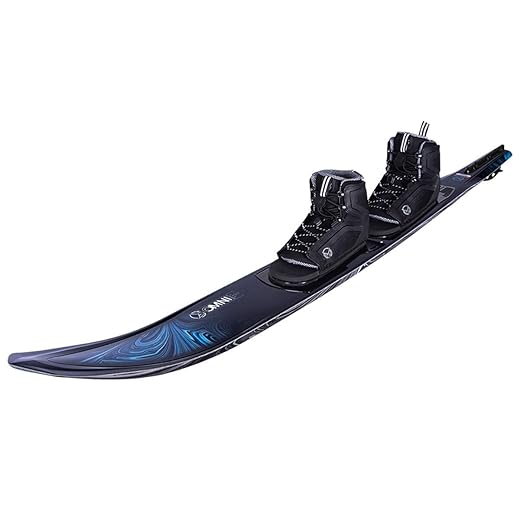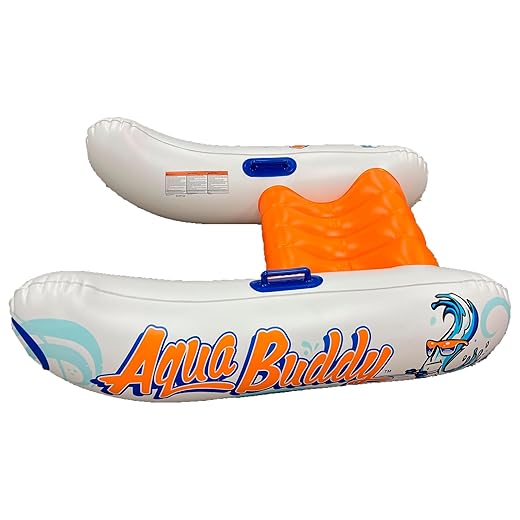When it comes to slalom water skiing, we all know it’s more than just a fun day on the water; it’s a pursuit filled with adrenaline and artistry. As we glide through the waves and weave between buoys, we can’t help but feel a deep connection to the sport and its vibrant community. In today’s blog post, we’re diving into the exhilarating world of slalom water skiing competitions. Together, we’ll uncover some of the most iconic events that capture our passion, showcasing their history, unique features, and what makes them so significant to us as water skiing enthusiasts. Whether we’re seasoned pros or just starting out, there’s something inspiring about the competitive spirit, and we can’t wait to explore it with you!



The History of Slalom Water Skiing Competitions
Slalom water skiing has roots that stretch back to the late 1920s and early 1930s, evolving from a recreational pastime for thrill-seekers to a competitive sport loved by many around the globe. In this section, we’ll explore the origins of slalom water skiing, the establishment of formal competitions, and factors that played a crucial role in its global popularity.



Origins of Slalom Water Skiing
The concept of water skiing itself emerged in the 1920s, primarily credited to Ralph Samuelson, who pioneered the sport on Lake Pepin in Minnesota. Samuelson experimented with different techniques and equipment, and while his initial inventions were groundbreaking, it wasn’t until the 1930s that slalom-style skiing began to take form.
- Ralph Samuelson’s Innovations: He was the first to use a single ski, which set the stage for slalom skiing.
- Early Popularity: As water skiing grew in popularity among beachgoers and water sport enthusiasts, the idea of competing soon followed.
The Birth of Competitive Events
The first water ski tournament took place in 1939 on the Miami River, Florida. It marked the beginning of organized competitions, showcasing the skills of athletes attempting to navigate through a series of buoys – a defining aspect of slalom skiing.
- Initial Events: Competitions primarily consisted of jumping and tricks before slalom gained traction.
- Formation of Organizations: The 1940s saw the inception of the American Water Ski Association (AWSA) in 1939, which began standardizing competitions and rules.
The Role of the IWWF
In 1949, the International Water Ski Federation (IWSF), now known as the International Waterski & Wakeboard Federation (IWWF), was founded. This organization became pivotal in establishing global standards, rules, and a unified structure for events.
- Regulatory Framework: The IWWF developed a standardized set of rules that all member countries adopted, which helped maintain consistency across competitions.
- World Championships: The first World Water Ski Championships were held in 1955, solidifying slalom skiing’s place in the competitive arena.
Major IWWF Events:
| Year | Event | Location |
|---|---|---|
| 1955 | First World Water Ski Championships | England |
| 1977 | Establishment of IWWF slalom division | Switzerland |
| 1990 | First IWWF World Junior Championships | USA |
| 2019 | Expansion of events to include wakeboarding | China |
Growing Popularity Worldwide
From the mid-20th century, slalom water skiing began to gain immense popularity. Factors contributing to this boom included increased media coverage, the rise of sponsors, and advancements in ski technology. Brands like O’Brien and Hyperlite led the charge in producing specialized equipment that catered to athletes at all skill levels.
Equipment Evolution:
- Skis: Skis like the O’Brien Valhalla or the Liquid Force Fish became popular among competitors for their design and performance.
- Ropes and Handles: Specifications for ropes and handles evolved to enhance control, with companies like Masterline creating tailored options for slalom skiers.
Key Components of Slalom Competitions:
- Buoys: Standardized at 12 inches in diameter, placed at set intervals.
- Speed Control: Designed boats like the Malibu Response TXi with innovative cruise control systems help maintain consistent speeds.
The Competitive Scene Today
Today’s competitive slalom water skiing scene is vibrant and diverse, with events occurring globally. Prominent leagues and tournaments capture the imagination of both athletes and spectators alike. The IWWF currently oversees numerous international competitions, including regional championships and the prestigious World Cup series.
Notable Current Events:
- Lake 38 Pro-Am: An annual event drawing top talent to compete in different water-skiing disciplines.
- Masters Water Ski & Wakeboard Tournament: Featuring elite athletes with the highest level of competition.
The Future of Slalom Water Skiing Competitions
As technology continues improving, so does the performance of athletes. Innovative gear and training methods promise an exciting future for slalom water skiing. With organizations like the IWWF leading the charge, the sport is likely to reach new heights in popularity, inspiring future generations to partake in this thrilling water sport.
Through competitions, innovation, and community, slalom water skiing has secured its place in the hearts of water sports enthusiasts worldwide. The unique blend of skill, speed, and excitement makes it a thrilling spectacle for fans and an exhilarating pursuit for competitors.
Major Competitions in Slalom Water Skiing
Slalom water skiing isn’t just a sport; it’s a thrilling art form that attracts athletes and enthusiasts from across the globe. Several major competitions set the stage for these talented watersport athletes, offering them a platform to showcase their skills, compete for prestigious titles, and connect with the water skiing community. Here, we dive into some of the most notable events in the world of slalom water skiing.


Masters Waterski & Wakeboard Tournament
History & Significance
The Masters Waterski & Wakeboard Tournament, held annually in Pine Mountain, Georgia, is one of the oldest and most prestigious events in the slalom water skiing calendar. Established in 1966, it brings together the best competitors from around the world, making it a must-see event for any watersport enthusiast.
Location
Located at the scenic Callaway Gardens, the event features a well-maintained slalom course that challenges skiers with its unique water conditions. The venue adds to the competition’s allure, as it boasts beautiful landscapes and fantastic facilities for both competitors and spectators.
Level of Competition
- Top athletes: This event attracts the cream of the crop, including competitors sponsored by major brands such as Nautique, Hyperlite, and O’Brien.
- High stakes: Competitors not only vie for the Masters title but also for a substantial prize purse, which further heightens the level of competition.
Key Highlights
- Athlete Participation: World-renowned athletes, such as Nate Smith and Regina Jaquess, have consistently participated, setting high performance benchmarks.
- Event Format: It comprises slalom, trick, and jump disciplines, providing a comprehensive showcase of water skiing talent.
World Waterski Championship
History & Significance
The World Waterski Championship is the most prestigious international tournament sanctioned by the International Waterski & Wakeboard Federation (IWWF). First held in 1949, the championship has grown into a significant event on the waterskiing calendar, attracting teams from over 50 countries.
Location
The championship travels worldwide, with recent events taking place in locations like the tranquil waters of Lake Elsinore, California, and the picturesque settings of Italy. The diversity of venues allows for varied water conditions, making it a true test of a skier’s versatility.
Level of Competition
- Global Representation: Each participating country sends its best athletes, often wearing gear from brands like Jobe, Radar Ski, or Connelly, representing their home nation.
- Competitive Format: The championship includes individual and team events, offering multiple opportunities for skiers to secure their standings at the world level.
Key Highlights
- Record-Breaking Performances: Many athletes use this platform to achieve world records, with past competitors securing their places in history books.
- Historical Moments: The championship has seen remarkable performances from legends like Jason McClintock and Anna Gay, who showcase astounding skills each year.
Pan American Games
History & Significance
The Pan American Games, which occur every four years, include water skiing as part of their aquatic sports roster. This multi-sport event is crucial for athletes in North, Central, and South America, providing them a shot at regional glory and qualification for other international events.
Location
The games take place in various host cities, with past editions being held in Toronto, Canada, and Lima, Peru. Each venue offers different aquatic environments, presenting unique challenges for competitors.
Level of Competition
- Regional Powerhouses: Competitors from powerhouses like the USA, Brazil, and Canada often dominate the medal count, using high-quality equipment from leading brands like MasterCraft and Correct Craft.
- Diverse Skill Levels: Athletes range from emerging talents to seasoned professionals, making it an exciting and unpredictable event.
Key Highlights
- National Pride: Competing on behalf of one’s country adds a layer of excitement and pressure, promoting a competitive yet friendly atmosphere.
- Emerging Talent: The games often serve as a launchpad for young athletes looking to establish themselves on the international stage.
Key Differences Between Major Competitions
| Competition | Year Established | Location | Key Highlights | Level of Competition |
|---|---|---|---|---|
| Masters Waterski & Wakeboard Tournament | 1966 | Pine Mountain, Georgia | Historical significance, top athletes | Elite, competitive |
| World Waterski Championship | 1949 | Various worldwide | Record-breaking performances | Global, highly competitive |
| Pan American Games | Every four years | Various host cities | National pride, emerging talent | Regional, varied skill levels |
These prestigious slalom water skiing competitions not only serve as a showcase for the sport’s elite but also foster community and camaraderie among athletes, sponsors, and fans. Whether you’re a competitor or a fan, these events offer something truly special, reflecting the dedication and passion that defines the world of slalom water skiing.
Notable Athletes in Slalom Water Skiing
Slalom water skiing is an exhilarating sport that requires precision, speed, and incredible skill. Over the years, several athletes have not only mastered this thrilling sport but have also shaped its evolution and popularity. Let’s dive into the lives and legacies of two phenomenal figures in the world of slalom skiing: Andy Mapple and Karina Nowlan.
Andy Mapple: The Trailblazer of Slalom Skiing
Andy Mapple, hailing from the UK, is widely considered one of the greatest slalom water skiers of all time. His influence transcends his athletic prowess; he’s also recognized for pushing the boundaries of the sport, making him a legendary figure in the skiing community.
Achievements and Records
- World Championships: Mapple has claimed multiple titles at the World Championships, asserting his dominance from the late 1980s to the early 2000s.
- World Record Holder: He was the first skier to break the 10.25-meter barrier in slalom, a record that stood for years.
- Professional Success: Andy Mapple has won numerous professional events, including the prestigious Masters Water Ski and the U.S. Open.
Contribution to Equipment Development
Mapple has significantly influenced the development of slalom ski equipment. His collaboration with brands such as HO Sports has led to advances in ski design and performance. For example, the HO Skis Syndicate Pro model, which he helped design, features innovative technology for improved stability and speed on the water.
Karina Nowlan: The Queen of the Water
Transitioning over to the women’s side, Karina Nowlan has made waves in the slalom skiing circuit. This Australian-born athlete has set high standards and continues to inspire countless young skiers.
Achievements and Records
- International Titles: Nowlan has secured numerous titles, including the Australian National Champion and medaled at many international competitions.
- World Record Holder: She pulled off an impressive feat in 2019 by becoming the first woman to break the 10.25-meter barrier.
- Consistent Performer: Karina has placed consistently in the top rankings at events such as the World Cup and the World Championships.
Impact on Popularity of the Sport
Karina Nowlan’s success has revitalized interest in women’s slalom skiing, making it more accessible and appealing to female athletes. Her partnership with renowned brands like Radar Skis has led to the development of performance-enhancing skis such as the Radar Lyric, which focuses on lighter construction but does not compromise on performance.
Influence on the Sport’s Development
Both Andy Mapple and Karina Nowlan have left lasting impacts on the slalom community, not only through their remarkable achievements but also by advancing the technology and equipment available to skiers today.
Equipment Features Comparison
| Feature | HO Skis Syndicate Pro | Radar Lyric |
|---|---|---|
| Technology | Tapered Flex for stability | Featherweight design |
| Recommended Skill Level | Intermediate to Expert | Beginner to Intermediate |
| Weight | 6 lbs | 5 lbs |
| Special Features | Reduced drag for higher speeds | Quick release fin for easy adjustments |
| Ideal Usage | Competitive slalom skiing | Training and recreational use |
These advancements in equipment, coupled with the athletes’ relentless pursuit of excellence, have undoubtedly fueled the growth of slalom skiing as a competitive sport. With role models like Mapple and Nowlan paving the way, the future of slalom water skiing looks bright and inspiring for the next generation of athletes.
Key Takeaways and Final Thoughts
In conclusion, exploring famous slalom water skiing competitions opens our eyes to the sport’s vibrant history and ongoing evolution. By delving into these events and the remarkable athletes who participate, we gain a greater appreciation for the incredible skill and dedication that slalom water skiing demands. Whether we’re seasoned fans or newcomers, attending a local or major competition promises to be an exhilarating experience that connects us to the heart of this dynamic sport. Let’s get out there and thrill in the excitement of slalom water skiing!







Thanks for the comment! The MasterCraft ProStar 197 is indeed a classic in the slalom world. It’s great to see it getting the recognition it deserves!
Super cool article! For those looking to get into slalom skiing, I’d suggest checking out the Connelly Aspect slalom ski. It’s beginner-friendly and gives a solid performance!
Awesome tip! The Connelly Aspect is a great choice for newcomers. Starting with the right gear can make all the difference!
Really enjoyed this read! I’ve always admired the athleticism of slalom skiers. But wow, the injuries can be serious too! Anyone have stories on how to stay safe while skiing?
Great point! Safety is key in slalom skiing. Always wear a life jacket and consider taking a few lessons to learn proper techniques. It’s better to be safe than sorry!